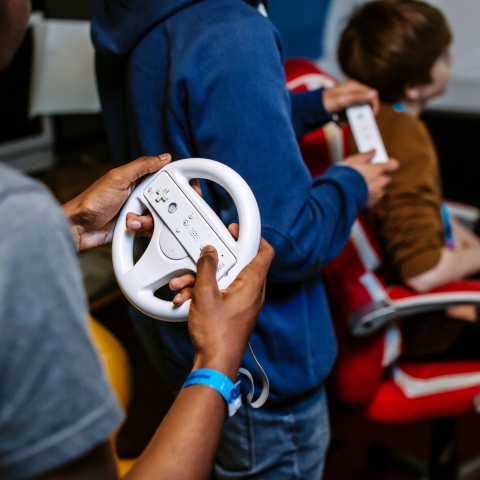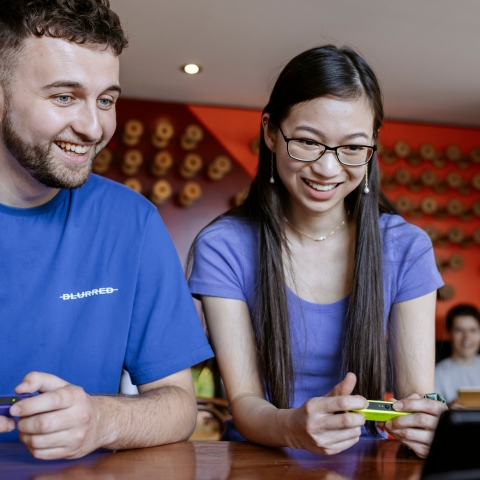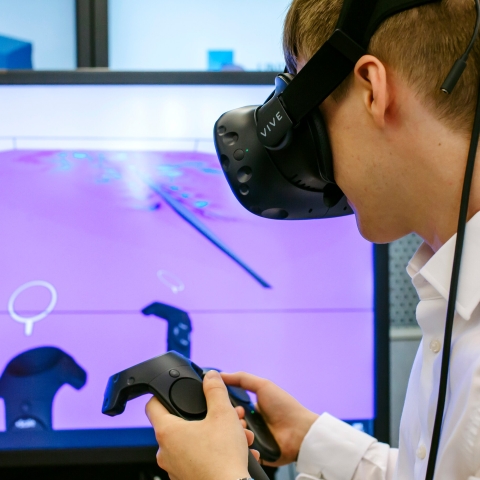
Many potential employers look for transferable skills, such as communication, problem-solving, teamwork and the ability to learn and take on board feedback. Required software skills will vary depending on the area chosen, but can include C++, Python, Maxscript and HTML. Artists may also need experience with Max, Photoshop and Illustrator.
Recruits to the industry will likely start in a more generalist role, making varied skills essential. Embracing additional opportunities beyond your course will help you to stand out from the crowd and provide working examples to support your graduate applications.
Types of Opportunities
Below are examples of the different ways you can gain experience while you study.
Placements will give you a long-term look at an organisation, and help you to build contacts and experience.
On some degrees, work placements are part of the programme, whilst on others you can choose to complete a placement as one of your modules. To learn more about completing a placement year, you can contact the Placement Team in the Careers & Employability Service.
Learn more about taking a placement
Many students from the Faculty of Creative and Cultural Arts choose to take a Self-Employed Placement. This allows you to work for yourself during your placement year and receive support from the University's Student Startup Team. You will have access to funding opportunities, networking events and workshops.
Internships are usually for a fixed period and give you more hands-on experience. Many employers will treat interns in the same way as full-time employees, so when future job roles ask for 'at least one year's experience' you can include an internship in this type of experience.
Within the games industry competition for internship positions is fierce and it will be essential to stand out as a candidate. Therefore, it's important to consider the following:
- How many games have you made yourself?
- Have you entered competitions or taken part in game jams?
- Have you learnt to do any programming and/or art?
- How have you showcased your games and other creations on online sites or forums?
- Have you covered a broad range of game genres in the content you’ve created?
It is worth considering the voluntary sector for work experience. Voluntary work with community art initiatives can be valuable. Seize any opportunity to get involved in local community projects to help you develop your work experience. Our Volunteering Bank provides local opportunities to undertake alongside your studies.
Examples of computer support/design roles that the Volunteering Team have previously advertised and recruited for include:
- IT Support Development Volunteer with The Repair Cafe
- Website Maintenance and Update Volunteer with the Conservation Trust
- STEM Ambassador with STEM Learning
It’s a good idea to participate in game jams and enter competitions where you can, in order to showcase your skills, build up your portfolio and expand your network. As well as looking out for potential opportunities in your faculty, check out the following sites for details of further competitions and game jams:
- The Game Design World Championships - a free, global competition for games developers
- Tranzfuser™ which is an innovative talent development programme developed by UK Games Talent, working with a host of regional contributors and funded by the UK Government.
- Online game jams via itch.io
- Indie Game Jams
Where to find opportunities
Explore the various areas of your sector before you apply for work experience; knowing what you want to specialise in will help you focus your research and ensure you gain the relevant skills.
- Games Industry Jobs advertises a limited number of internship opportunities with companies across the UK and around the world.
- Grads In Games although Grads In Games is currently on hiatus (as of September 2024), they still post details of relevant internships on their LinkedIn page
- The British Interactive Media Association (BIMA) – Aims to showcase and reward great digital work, share knowledge and best practice and support and develop future talent
- Creative Pool – Connecting individuals and companies, providing a platform to showcase and share work, follow and connect with agencies, brands and freelancers. The site also offers a job search function across creative industries, including games

Consider speculative applications
When you approach an employer directly, you send them a speculative application. Speculative applications involve sending a CV and cover letter to an employer to ask if they can offer any work experience, even if the company is not currently advertising placements or internships.
Submitting a speculative application shows your interest in a specific company and your willingness to go above and beyond to develop your skills and understanding of the industry.
Tips for finding work experience
- Try to have something that makes you stand out in your applications: join and get involved in relevant university groups or projects, such as the Gaming Society . This is a good way of demonstrating your motivation and interest in this area of work
- Tailor your project work towards themes that interest you
- Keep up to date with developments in the games industry
- Speak to your tutor or other members of Faculty staff researching the areas that interest you, as students are sometimes recruited to work on research projects over the summer.
- Start early! Get involved and volunteer during your first and second year to help boost your employability opportunities once you graduate.
Building work experience
Learn more about how we can support you in securing experience and translating the skills you gain to future applications.

Explore the Computer Game Technology Career Guide
Computer games technology career guide
Your guide to building a career in computer game technology.

Getting started in computer game technology
Take the first steps to beginning your career in computer game technology.

Finding a job in computer game technology
Explore different ways you can find employment after you graduate.

Enable University alerts
Turn on notifications for critical updates like closures, safety alerts, and urgent service disruptions.






